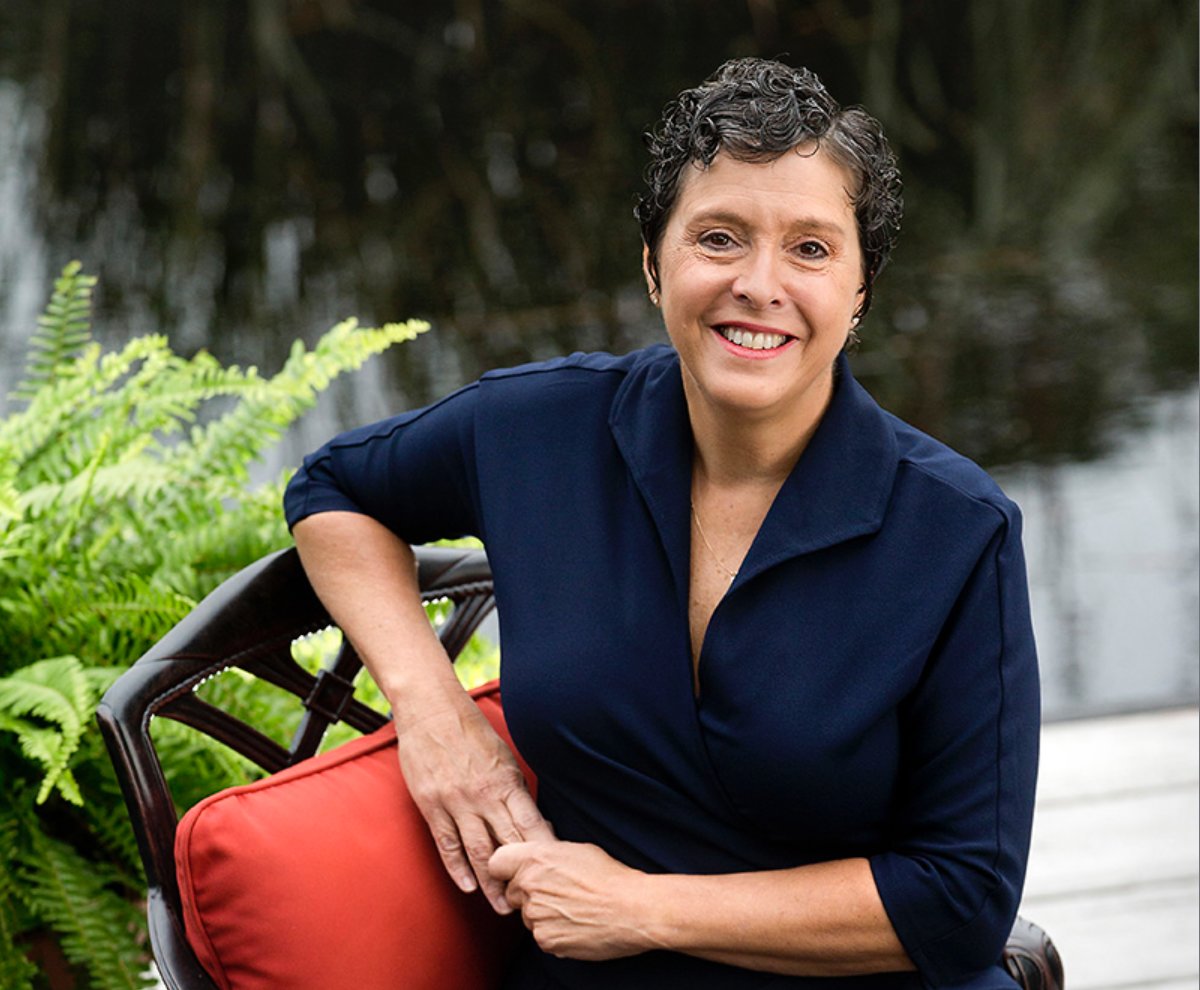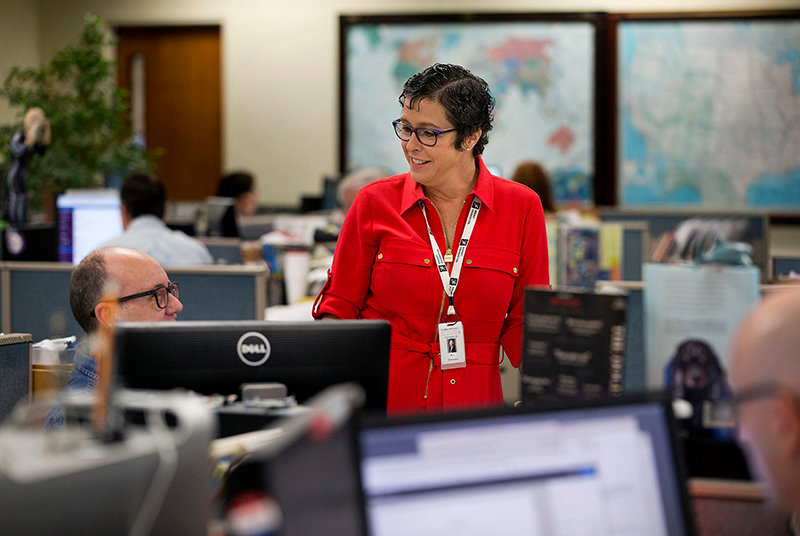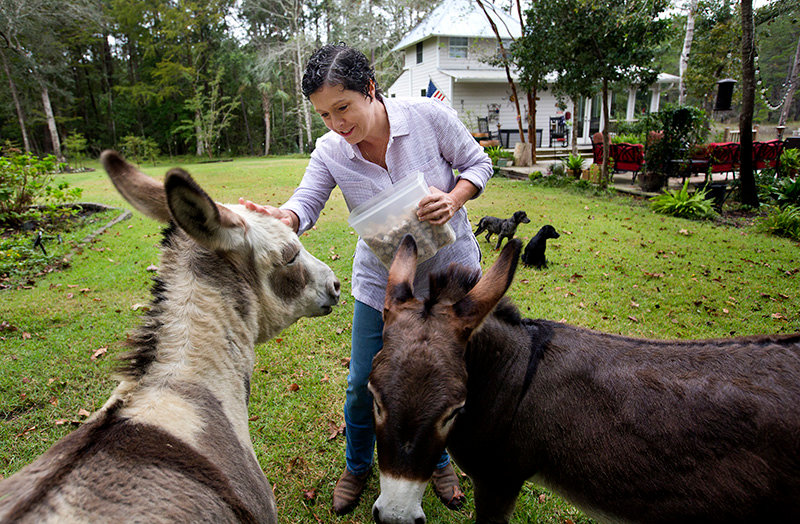 P.J. Browning (Photo by Grace Beahm Alford/Post and Courier)
P.J. Browning (Photo by Grace Beahm Alford/Post and Courier)
Our 2019 Publisher of the Year, P.J. Browning, calls herself a “newspaper brat.” With a journalism career that spans more than 30 years, it’s easy to understand why. Browning, 55, started her career by taking classified ads over the phone for the Springfield (Mo.) News-Leader. It was a part-time job for the college student, who was studying marketing at Southwest Missouri State University (now Missouri State University).
“I came from a family that read newspapers,” Browning said. “Dad read sports, Mom read features, and I read the classifieds—that’s how I found the job.”
Once Browning was surrounded by the fast-paced energy that took place inside a daily newsroom, she was hooked.
Browning’s career has taken her to Fort Collins, Colo., Grand Rapids, Mich., and Asheville, N.C. Her first job as a publisher was with the Sentinel in Carlisle, Pa. From there, she served as publisher at the Centre Daily Times in State College, Pa.; the Telegraph in Macon, Ga.; and the Sun News in Myrtle Beach, S.C. In 2012, she became publisher of the Post and Courier in Charleston, S.C. She also currently serves as senior vice president of Evening Post Industries (the paper’s parent company) and as president of the newspaper division, where she oversees one other daily, the Aiken Standard, and several other community weekly publications, all based in South Carolina.
Over the last seven years, Browning has elevated the Post and Courier to a new level. By investing in digital growth, events and other innovative revenue projects, the paper is now charting a course focused on creating a long-term sustainable business model that will keep the Post and Courier going for many years to come.
Pushing Boundaries
According to Browning, digital is constantly a part of her daily conversations with her staff. This push started in 2017 when the Post and Courier was invited to participate in Poynter’s Local News Innovative program, also known as Table Stakes. The paper was among 21 news organizations in the program, which focused on turning newsrooms into digital-first enterprises.
“When we started Table Stakes, I knew it was going to be a commitment,” Browning said. “We began to take digital more seriously…we knew our business had to change, and at times, it was frustrating because I had to have some very hard and uncomfortable talks with my team about how we were going to strategize and plan, but once we executed it, we could see a future.”
Browning said by the time they walked out of Table Stakes, they had a two-year plan to increase audience development and digital subscriptions, starting first with how they were going to publish their online content.
Executive editor Mitch Pugh said before the paper joined Table Stakes their mentality for digital was “set it and forget it.” When he joined the paper in 2013, there was a metered paywall already in place, but no one was paying attention to it. But once they did start paying attention, things started to change. They started publishing fewer stories and devoted more time on in-depth expertise stories. They also expanded their content areas to include topics that resonated more with readers like food, politics, entertainment and real estate.
Once the Post and Courier started to target and engage with their audience differently, they began to see results. Over the course of two years, digital subscriptions increased by 250 percent, from roughly 1,700 to about 5,975. Current digital-only subscribers are now a little more than 7,000.
That kind of success only happens due to support from the top, said Pugh.
“(Browning) knew a lot of structure was going to be needed in order to organize this, so she brought in more reporters to create long-form journalism,” he said. “We used to have two reporters and now we have five working on meaningful big projects.”
With more expertise stories and impactful projects available to readers, the Post and Courier was also able to generate nearly $900,000 in new product revenue. Pugh told Better News, they placed staff members in mini-publishing groups. Their role was to “manage and share expertise on digital subscriptions, email sales, newsletter sponsorships, contesting and other emerging products like merchandise and podcasts.” For example, the food mini-publishing group launched three revenue-generating events in the first year; revamped the food newsletter and grew subscribers; launched a podcast with early sponsors; and improved content to become one of their most successful sections, according to Pugh.
Even though the newsroom did a lot of “heavy lifting,” Browning said all departments worked together to roll out this transformation. She described it as a cross-divisional collaboration, where reporters worked with the marketing team and digital editors worked with sales managers.
Table Stakes was only the beginning. Earlier this year, the Post and Courier was one of 10 newspapers selected to participate in the Google News Initiative (GNI) Digital Subscriptions Lab. The Lab, in partnership with Local Media Association and FTI Consulting, was a six-month program that helped newsrooms find reader revenue strategies while using the resources provided by the three partners.
“This takes us to the next stage,” Browning said. “We’re a small, but mighty group, so it’s a gift to be able to learn more from Google, LMA and FTI Consulting.”
As a result of the Lab, the paper found several benchmarks they will work on for the next five years. Browning called it a “roadmap” that will help them concentrate on growing their digital subscription base and create a sustainable model in the Charleston market.
Although print still plays a big part in their company, the Post and Courier understand digital is the future.
“It’s a clear and compelling vision,” Pugh said, referring to Browning’s plan to go after their digital audience through content, marketing and events. “I believe we’re going to come out the other end even more profitable, and I feel good about it.”
 P.J. Browning photographed in the newsroom. (Photo by Grace Beahm Alford/Post and Courier)
P.J. Browning photographed in the newsroom. (Photo by Grace Beahm Alford/Post and Courier)
“An Inspirational Leader”
One of Browning’s proudest moments as publisher was in 2015 when the Post and Courier won the Pulitzer Prize for Public Service for its series on domestic violence, “Till Death Do Us Part.” It was the paper’s first Pulitzer win in 90 years. Since then, the paper has been named a finalist three times, proving that the 2015 win wasn’t a one-shot deal, said Pugh.
“We’ve sustained that same quality of journalism, and it has given us a sense of where we want to be,” he said. “It also shows our audience that this is content worth paying for, which leads to financial success with new subscribers.”
The city of Charleston has been the center of several national news stories, such as the April 2015 shooting of Walter Scott, an unarmed black man who was shot and killed by a white police officer, and the June 2015 mass shooting that occurred at Emanuel African Methodist Episcopal Church that left nine people dead. The paper’s coverage of both events ended up as Pulitzer Prize finalists.
The church shooting was a “dark time for our community,” Browning said.
“There was a lot of pain and hurt,” she said. “But we had a group of reporters that produced story after story; it was amazing to see everyone come together. It really showed the strength of the newsroom.”
As publisher, Browning made it a point to “be very visible” to her team during this time, whether it was just to talk, give hugs, or as she put it, “It’s the South. We pray.”
“She put a lot of trust in the team to get this news covered,” Pugh said. “But she checked-in frequently to make sure we had everything we needed and to offer help. Whenever we process these tough stories, she’s always concerned about the well-being of our people. It’s a family atmosphere.”
When Post and Courier reporter Jennifer Berry Hawes decided to work on a book based on her reporting about the church shooting, Browning offered her full support. Hawes is a member of the watchdog and public service team, and a Pulitzer Prize winner and finalist. Her book, “Grace Will Lead Us Home: The Charleston Church Massacre and the Hard, Inspiring Journey to Forgiveness,” was published this summer, and proceeds will support a minority reporting internship program at the Post and Courier. According to Browning, funds from the book have already supported two internships.
The same way Browning has been there for her newsroom, the newsroom was there for her when she was diagnosed with ovarian cancer in September 2018. She was out of the office for eight weeks.
“My approach was not to let her down while she was out, that nothing would fall apart and everything would be kept on track,” Pugh said. “We were prepared to handle it.”
And when Browning returned to the office, Pugh said, “She rolled up her sleeves and was ready to get back to work.”
John Barnwell, president and CEO of Evening Post Industries, called Browning an “inspirational leader” for battling cancer and overcoming whatever challenges she faced in and out of the office.
Happy to be back doing what she does best, Browning’s last chemo treatment took place on Jan. 23, 2019. A day, she said, she would never forget.
Taking Risks
In addition to the transformational digital work Browning is conducting in the newsroom, she is also exploring events in inventive and exciting ways. One of them is the paper’s recent acquisition of the Steeplechase of Charleston, a National Steeplechase Association sanctioned race meet. The association was founded in 1895, and the Steeplechase of Charleston started in 1986. Taking over the horse racing event made sense to Browning.
“First, there’s the rich history (the first horse race in Charleston was held in 1792, and Charleston is home to the nation’s first jockey club), and the ability to build on its success to increase revenue and attendance,” she said. “Our goal is to one day grow large enough so we can become the Kentucky Derby of South Carolina.”
To prepare for Nov. 17 (the date of the first race under the newspaper’s ownership), a marketing team was put together to promote the event, and a staff member from the sales team was designated to work exclusively on bringing in national and local revenue.
“We take calculated risks, so we’re going big on events,” Browning said.
Working for a local, family-owned independent company also makes a big difference when it comes to taking these calculated risks. Although Browning has experience with the corporate side and understands they have the same endgame, she said, “We just have a little longer runway” at the Post and Courier.
Pugh agreed, adding that Browning operates a very open newsroom with few surprises.
“There are no closed doors,” he said. “Yes, the expectations are high, but we’re more transparent and moving at a pace not seen at most places.”
 P.J. Browning feeds the various animals on her “mini-farm.” (Photo by Grace Beahm Alford/Post and Courier)
P.J. Browning feeds the various animals on her “mini-farm.” (Photo by Grace Beahm Alford/Post and Courier)
Pamela Jo
Like any other publisher, Browning has a pretty active schedule. She was the 2018-19 president of the Southern Newspaper Publishers Association (SNPA) and was instrumental in its recent merger with the Inland Press Association. She serves on the SNPA Foundation board and is the current president of the South Carolina Press Association. Just a few months ago, she traveled to Washington D.C. with several other members of the News Media Alliance (where she is a board member) to meet with members of the House and Senate to seek support for the Journalism Competition and Preservation Act, a “safe harbor” bill that would allow news publishers to negotiate with tech platforms such as Facebook and Google for better business arrangements.
“If there are publishers out there playing golf, what’s your number?” she joked.
What keeps Browning going is the “adrenaline.”
“I love what I do, and I’m not ready to retire,” she said. “I’ve had some added perspective in my life (referring to her cancer battle). I have a cause—an extremely passionate cause—and that’s to fight for the future of this industry.”
Outside of the office, Browning keeps busy too. For six years, she served as a United Way board member and recently ended her term as president of the board. She also serves on the Trident Technical College advisory board.
“Sometimes my days start at 5 p.m.,” she said.
Browning and her husband, Kerry, have three adult children and four grandchildren, but it’s not the grandkids that have her running around. She lives on what she calls a “mini-farm,” five acres currently occupied by a mini-donkey, three micro-cows, eight chickens, three adopted cats and two adopted puppies.
But that wasn’t the most interesting thing I learned. I still had one more question to ask: “What does P.J. stand for?”
It turns out P.J. is Pamela Jo.
“In school, I grew up with three Pams. The first kept Pamela, the second got Pam, and I got my middle name, so I became P.J.,” she explained. “When I started at the Springfield News-Leader, the exact same thing happened. There were three Pams and we all worked really close together, and out of frustration one day, one of the managers said to me, ‘What is your middle name?’ and I became P.J. once again.”
With a memorable journalism career, a long-term vision for her newsroom, and an entrepreneurial spirit that’s creating new business for her company, it’s safe to say Pamela Jo aka P.J. Browning has made a one-of-a-kind name for herself.
Editor's Note: Check out our podcast with P.J. on "E&P Reports."
Comments
No comments on this item Please log in to comment by clicking here